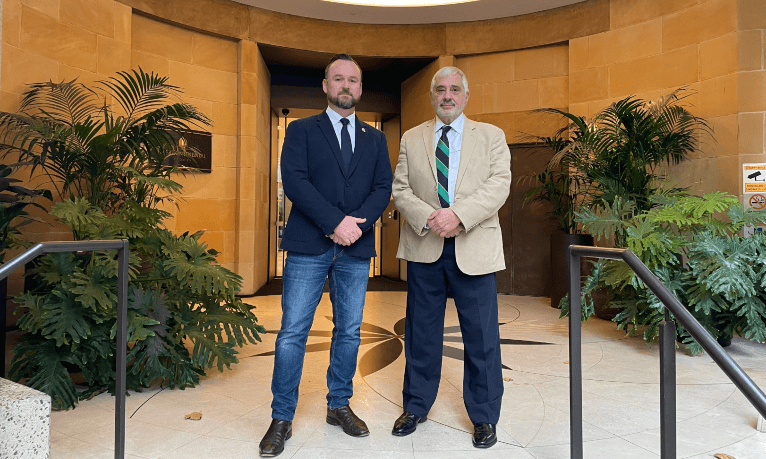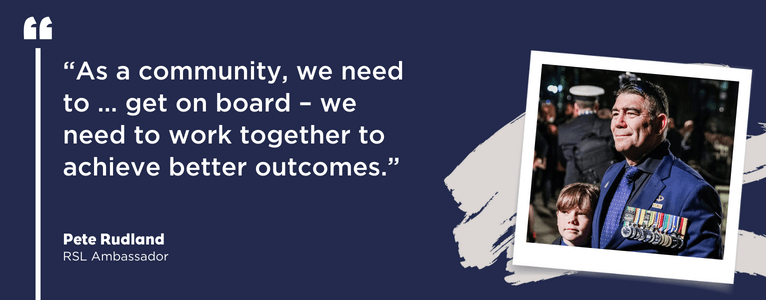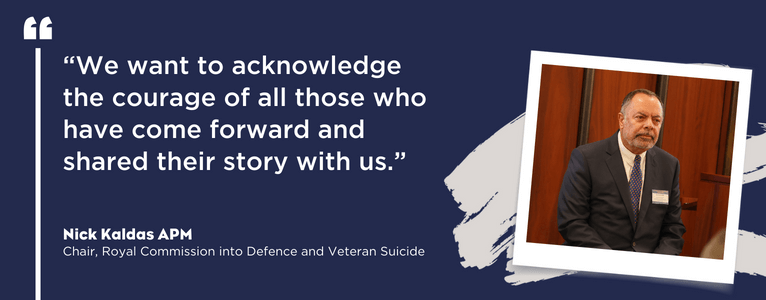Royal Commission: How far have we come, and what’s next?

As the final hearings begin for the Royal Commission into Defence and Veteran Suicide, we look back at its progress so far and identify priorities for the future.
At a glance:
- The current hearing block in Sydney marks the 12th session that has been held across Australia since November 2021.
- Following a final report due by 9 September, it will be paramount to support the implementation body that will follow the Royal Commission.
- “Long-lasting and meaningful reforms will take time and a concerted effort from both sides of politics,” said Commissioner Nick Kaldas APM. “It’s imperative these issues are not politicised.”
- RSL NSW, our charity partner RSL LifeCare Veteran Services, RSL Australia and other partner organisations are committed to supporting the Commission’s findings and recommendations.
This article discusses veteran suicide and other issues that may impact the veteran community. If any of this raises issues for you, don’t go through it alone:
- Open Arms 24-hour Support Line (1800 011 046)
- Suicide Call Back Service (1300 659 467)
- Lifeline 24/7 Crisis Support (13 11 14)
The Royal Commission into Defence and Veteran Suicide has commenced its final set of hearings in Sydney.
The hearing block will feature approximately 40 witnesses through to the end of the month, including Deputy Prime Minister and Minister for Defence the Hon Richard Marles MP, and Minister for Veterans’ Affairs the Hon Matt Keogh MP.
RSL NSW, our charity partner RSL LifeCare Veteran Services, RSL Australia and other partner organisations are committed to supporting the Commission’s findings and recommendations.
Here’s a look at the progress of the Commission so far, and why the next steps post-Commission will be so important to continuing addressing the national tragedy of Defence and veteran suicide.
Progress of the Commission
A Royal Commission tasked with examining systemic issues contributing to suicide within the Defence and veteran community was established in July 2021.
The current hearing block marks the 12th session that has been held across the country.
The release of an interim report in August 2022 delivered 13 recommendations. These focused mainly on:
- Legislative reforms that would enable information gathering through the remainder of the Commission
- Simplifying veterans’ access to entitlements
- Ensuring the Department of Veterans’ Affairs (DVA) clears a backlog of claims and processes future claims in a timely manner
The majority of that DVA claims backlog has now been cleared.

The RSL has been represented at almost all hearing sessions by Army veteran, RSL NSW member and RSL Ambassador Pete Rudland, who has counselled people with PTSD and is a staunch advocate for improving veteran wellbeing.
RSL NSW has also established a Royal Commission Office at ANZAC House to support veterans engaging in the Commission.
Speaking to RSL NSW in June 2023, Rudland shared an initial hesitancy about the prospect of a Commission.
“I had reservations about how the veteran community would be represented and if the Royal Commission would accurately engage with younger veterans,” he explained. “But those concerns were quickly put to bed.
“As a community, we need to … get on board – we need to work together to achieve better outcomes.”
A national tragedy
In his opening address on the first day of the hearing, Commissioner Nick Kaldas APM reflected on the progress of the inquiry across the past 32 months.
“We now know there have been 1,677 confirmed deaths by suicide between 1997 and the end of 2021 for those who served after 1985,” he said. “If we include confirmed suicide deaths back to 1985, that number grows by 330 to 2,007 [deaths].”

Kaldas commented that these figures likely underestimate the real number of deaths by suicide and do not encompass deaths of ex-service personnel due to drug and alcohol [abuse], “both accidental and [of] undetermined intent”.
He said the number of confirmed suicide deaths has continued to grow and that the resultant “national tragedy” necessitates widespread change.
“It’s important to recognise that there will be no quick fix to these issues. And real, long-lasting and meaningful reforms will take time and a concerted effort from both sides of politics.
“It’s imperative these issues are not politicised.”
Next steps the most important
The Commissioners are due to submit a final report by 9 September containing further recommendations for change.
Beyond that point, it will be paramount to support the implementation body that will follow the Royal Commission. RSL NSW firmly believes this entity should have a role in supporting the implementation of the Royal Commission’s recommendations, while also keeping a permanent watch on the wellbeing of veterans and their families.
“The proposed permanent, independent and fully funded entity must be at the forefront of Australia’s new and determined effort to care for our Defence members, veterans and their families,” said RSL Australia Greg Melick.
“The RSL has made a series of recommendations and suggestions regarding the functions and governance of the proposed entity, its investigation, reporting and engagement responsibilities and the formation of an expert and experienced Advisory Council.”
RSL NSW looks forward to providing input to this body in the form of the views and perspectives of the wider veteran community.

RSL NSW President Mick Bainbridge and RSL Australia President Greg Melick on the first day of the final Royal Commission hearing.
As a result of the Commission, RSL NSW believes ex-service organisations are already collaborating more effectively and streamlining the delivery of support and services to veterans and their families.
The Commission has clarified the importance of support networks and strengthened awareness about barriers to access those networks – which is necessary to make a tangible difference in people’s lives.
“Our lines of inquiry have been informed by the voice of lived experience and we want to acknowledge the courage of all those who have come forward and shared their story with us,” said Kaldas.
“It’s been their deeply personal and often harrowing experiences that have shone a bright light on the cultural and systemic issues that are failing serving and ex-serving ADF personnel, and which are contributing to the national crisis of Defence and veteran suicide.”






